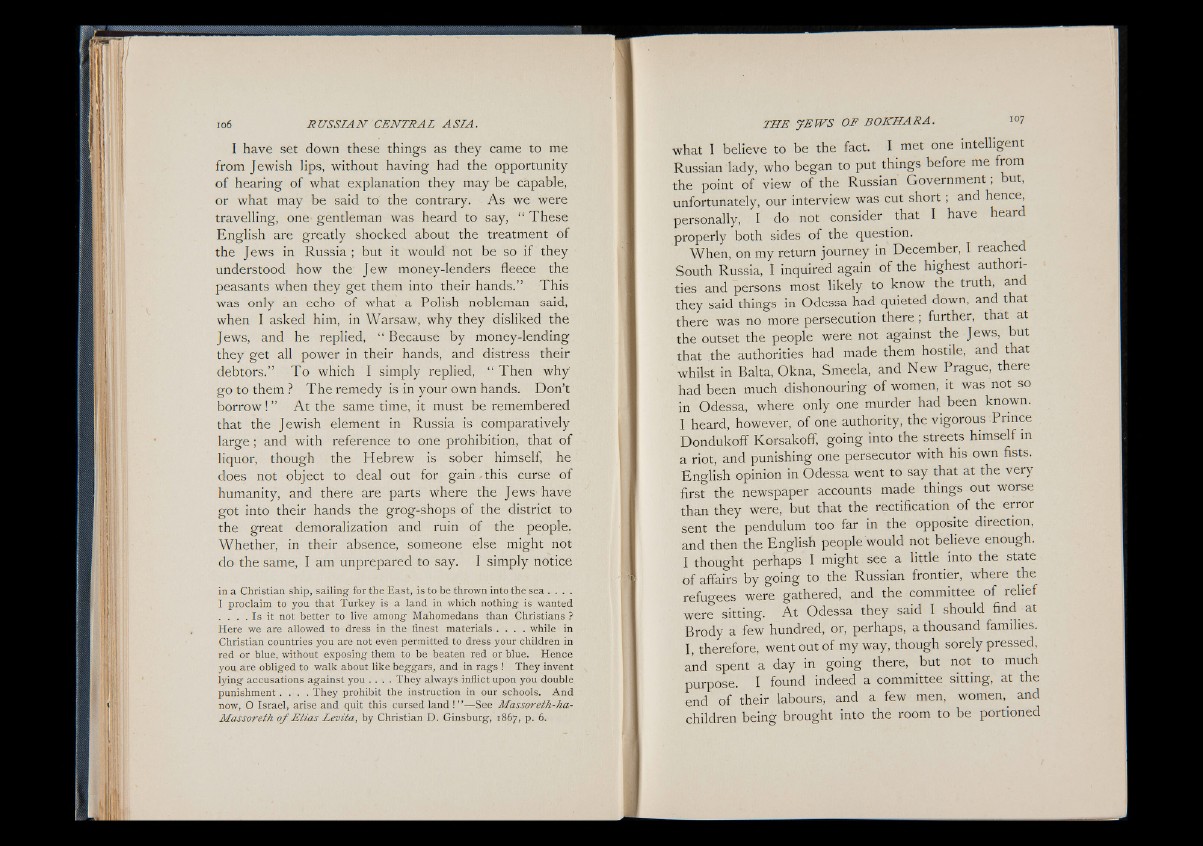
I have set down these things as they came to me
from Jewish lips, without having had the opportunity
o f hearing of what explanation they may be capable,
or what may be said to the contrary. A s we were
travelling, one- gentleman was heard to say, “ These
English are greatly shocked about the treatment of
the J ews in Russia ; but it would not be so if they
understood how the Jew money-lenders fleece the
peasants when they get them into their hands.” This
was only an echo of what a Polish nobleman said,
when I asked him, in Warsaw, why they disliked the
Jews, and he replied, “ Because by money-lending
they get all power in their hands, and distress their
debtors.” T o which I simply replied, “ Then why
go to them ? The remedy is in your own hands. Don’t
borrow! ” A t the same time, it must be remembered
that the Jewish element in Russia is comparatively
la rg e ; and with reference to one prohibition, that of
liquor, though the Hebrew is sober himself, he
does not object to deal out for gain,this curse of
humanity, and there are parts where the Jews- have
got into their hands the grog-shops of the district to
the great demoralization and ruin of the people.
Whether, in their absence, someone else might not
do the same, I am unprepared to say. I simply notice
in a Christian ship, sailing for the East, is to be thrown into the sea . . . .
I proclaim to you that Turkey is a land in which nothing is wanted
. . . . Is it not better to live among Mahomedans than Christians ?
Here we are allowed to dres's in the finest materials . . . . while in
Christian countries you are not even permitted to dress your children in
red or blue, without exposing them to be beaten red or blue. Hence
you are obliged to walk about like beggars, and in rags ! They invent
lying accusations against you . . . . They always inflict upon you double
punishment . . . . They prohibit the instruction in our schools. And
now, O Israel, arise and quit this cursed land ! ’ ’— See Massoreth-ha-
Massoreth o f Elias Levita, by Christian D. Ginsburg, 1867, p. 6.
what I believe to be the fact. I met one intelligent
Russian lady, who began to put things before me from
the point of view of the Russian Government, ut,
unfortunately, our interview was cut sh o r t; and hence,
personally, I do not consider that I have heard
properly both sides of the question.
When, on my return journey in December, I reached
South Russia, I inquired again of the highest authorities
and persons most likely to know the truth, an
they said things in Odessa had quieted down, and that
there was no more persecution th e re ; further, that at
the outset the people were not against the Jews, but
that the authorities had made them hostile, and that
whilst in Balta, Okna, Smeela, and New Prague, there
had been much dishonouring of women, it was not so
in Odessa, where only one murder had been known.
I heard, however, of one authority, the vigorous Prince
Dondukoff Korsakoff, going into the streets himself in
a riot, and punishing one persecutor with his own fists.
English opinion in Odessa went to say that at the very
first the newspaper accounts made things out worse
than they were, but that the rectification of the error
sent the pendulum too far in the opposite direction,
and then the English people would not believe enough.
I thought perhaps I might see a little into the state
o f affairs by going to the Russian frontier, where the
refugees were gathered, and the committee of relief
were sitting. A t Odessa they said I should find at
Brody a few hundred, or, perhaps, a thousand families.
I, therefore, went out of my way, though sorely pressed,
and spent a day in going there, but not to much
purpose. I found indeed a committee sitting, at the
end of their labours, and a few men, women,^ and
children being brought into the room to be portioned